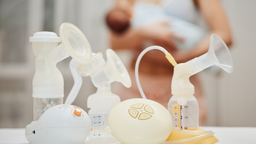AGITATED? ANGRY? ANXIOUS?
Have you ever felt agitated while breastfeeding? Have you had negative thoughts or feelings? Do you feel anxious, angry, or trapped?
These unwanted and unpleasant feelings are increasingly recognized and are now known as “breastfeeding aversion and agitation” (BAA). Mothers who experience this can feel guilt, shame, and fear about discussing their feelings with others. We reached out to Zainab Yate, the founder of the website Breastfeeding/Nursing Aversion and Agitation, to ask a few questions about BBA. She is the mother of two children and lives in the U.K. See below for information about a support course she offers through her website.
WHAT IS BREASTFEEIND AVERSION AND AGITATION?
While a baby, toddler, or child is latched on, some mothers suffer from negative feelings or intrusive thoughts. This is a phenomenon called breastfeeding aversion and agitation. It is a rarely discussed topic as many women do not want to talk openly about it or are perhaps afraid to share these feelings.
Unwanted thoughts and emotions mostly surface when baby is latched onto the breast. These emotions include feeling anxious, agitated, angry, disgusted, or rageful. Many women then shameful or guilty for having these feelings.
The thoughts or feelings brought on by BAA are specifically about breastfeeding. A mother suffering from these might feel like she wants to run away, wants to stop breastfeeding, feel trapped in the situation, and have an urge to stop feeding. Usually, these feelings and thoughts disappear when the baby stops feeding.
It often results in a difficult conflict of wanting to carry on breastfeeding but having to de-latch because of encountering such strong emotions and feelings. It is also particularly hard for mothers suffering to open up to somebody as these emotions she is experiencing might make her feel ashamed of herself with guilt about not “loving breastfeeding.”
WHAT CAN I DO ABOUT IT?
BAA is often found in mothers nursing older children, and if this is the case, mothers may have to create boundaries and shorten or lessen feeds. This can take time, and practice, and can be difficult for both parties to stick to. Counting down from 20 to 0 or singing a song loudly and ending the session when it is finished is a good place to start.For some women, it is linked to their hormonal cycles, and finding this kind of pattern emerging helps mothers to “bear with it” for a few days because they know it will pass. It is a good idea to start a diary to log the experience and record how long it continues.
If a mother is experiencing these symptoms, she should consult with her doctor to check for female hormone and vitamin deficiencies to make sure it isn't another condition that she is struggling with. Some mothers find vitamin B complex supplements and magnesium supplements/sprays helpful to lessen their experience.
Cognitive distraction - distracting oneself while feeding - is also an effective coping strategy. A cognitive distraction can be used to focus the brain on another activity so as to not spend all its energy dwelling on the negative emotions that have been triggered. Phones and squeezy stress balls are most commonly used.
HELP AND SUPPORT
Firstly, it important to understand that no feelings are wrong feelings. Women are feeling what they are feeling because of a variety of factors in their breastfeeding journey and their mental and physical states. In a way, BAA can be entirely normal if it is considered a prerequisite to encourage weaning from the breast. However, if neither mom or baby are ready to, or if it is a difficult experience, women can need support.
Speaking about it often helps, knowing that you are `not alone` and getting tips from other moms is key.



